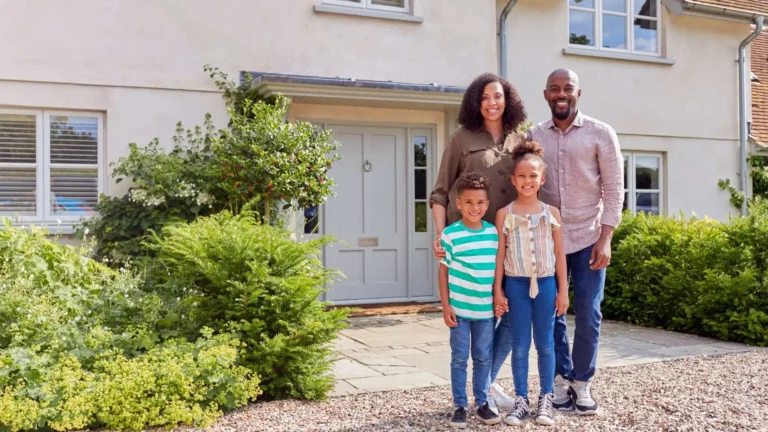Table of Contents
Buying a house is the most crucial financial decision anyone will ever make. It involves not only finding the perfect house but also arranging the money to buy it. Most people depend on a mortgage to buy a house, but some prospective customers may want to consider taking out a personal loan.
Can you get a personal loan to buy a house? This blog will discuss this question and its pros and cons. It will also give you other financing alternatives that are available to you. Let’s dive in!
Understanding Your Options
Various options are available for financing a home purchase, each with advantages and drawbacks. Understanding these options is crucial for making an informed decision that aligns with your financial situation and long-term goals.
People Also Read: Do Payday Loans Affect Your Credit Report? The Expert Angle
Personal Loans: Quick Cash, High Cost
Interest Rates and Repayment Terms
Personal loans are a type of unsecured debt, meaning they are not backed by collateral. Because of this, personal loans typically come with higher interest rates than secured loans like mortgages. The interest rates on personal loans can vary widely based on factors such as credit score, income, and loan amount. Repayment terms for personal loans are usually shorter, ranging from one to seven years, meaning higher monthly payments than a 15- or 30-year mortgage.
Pros and Cons of Unsecured Debt
One of the main advantages of a personal loan is the speed of approval and disbursement. Personal loans can be processed quickly, sometimes within a day, making them an attractive option for those who need fast access to cash. Additionally, personal loans do not require you to put up your home or any other asset as collateral, reducing the risk of losing your property if you fail to repay the loan.
However, the lack of collateral also means higher interest rates, which can significantly increase the cost of borrowing. The shorter repayment terms can also strain your monthly budget, making it harder to manage your finances. Personal loans also generally have lower borrowing limits, which may not be sufficient to cover the cost of a home purchase.
Mortgages: Long-Term Commitment, Lower Rates
Types of Mortgages (Fixed-Rate, Adjustable-Rate)
Mortgages are the traditional and most common method of financing a home purchase. They come in various forms, with fixed-rate and adjustable-rate mortgages being the most popular. A fixed-rate mortgage offers a consistent interest rate and monthly payment over the life of the loan, providing stability and predictability. On the other hand, an adjustable-rate mortgage (ARM) starts with a lower interest rate, which can change periodically based on market conditions, potentially leading to lower or higher payments over time.
Mortgage Qualification and Approval Process
Securing a mortgage typically involves a more rigorous qualification and approval process than personal loans. Lenders will evaluate your credit score, income, debt-to-income ratio, and employment history to determine your eligibility and the loan amount you can qualify for. The process can take several weeks, during which time you’ll need to provide documentation such as tax returns, pay stubs, and bank statements. While the process is more involved, mortgages generally offer lower interest rates and longer repayment terms, making them a more affordable option for buying a home.
Using a Personal Loan for a Down Payment
Weighing the Pros and Cons
Using a personal loan to cover the down payment on a home can be an option for those who are short on cash but eager to buy a property. However, this strategy has advantages and disadvantages that should be carefully considered.
Advantages and Disadvantages of Using a Personal Loan
One of the main advantages of using a personal loan for a down payment is the ability to secure the funds needed to make the purchase quickly. This can be particularly useful in competitive real estate markets where you must act fast. A personal loan can also help you avoid tapping into your savings or retirement funds.
However, using a personal loan for a down payment comes with significant risks. The higher interest rates associated with personal loans can make this an expensive option. Additionally, taking on additional debt can impact your debt-to-income ratio, making it harder to qualify for a mortgage. Lenders may also view this strategy as risky, potentially leading to higher mortgage rates or even rejection of your mortgage application.
Impact on Your Financial Health
Using a personal loan for a down payment can strain your finances, especially if you already have other debts. The additional monthly payments required to service the personal loan and your mortgage payments can quickly add up, leaving you with little room in your budget for other expenses or emergencies. It’s essential to carefully assess your financial situation and ensure you can comfortably manage the additional debt before taking out a personal loan for a down payment.

Alternatives to Consider
Other Ways to Finance Your Down Payment
Before opting for a personal loan, exploring other ways to finance your down payment is worth considering. One option is to save up for a larger down payment over time, which can help you avoid taking on additional debt. Consider lower down-payment mortgage programs, such as FHA loans, which require as little as 3.5% down. Additionally, some lenders offer down payment assistance programs, which provide grants or low-interest loans to help you cover the down payment.
When to Consider a Personal Loan
Specific Circumstances
There are certain situations where using a personal loan to buy a house might make sense. For example, a personal loan could provide the funds needed to secure a home if you’re dealing with temporary financial challenges, such as an unexpected medical expense or job loss. At the same time, you work to stabilize your finances. In such cases, having a clear plan for repaying the loan and managing your overall debt load is crucial.
People Also Read: Can You Use Personal Loans to Buy Land?
Situations Where a Personal Loan Might Be Suitable
A personal loan might also be suitable if you’re purchasing a fixer-upper property and need additional funds for renovations. In this scenario, a personal loan could provide the flexibility and quick access to cash needed to complete the project and increase the property’s value. However, it’s essential to weigh the costs carefully and ensure that the potential return on investment justifies the additional debt.
Temporary Financial Challenges
For those facing temporary financial setbacks, a personal loan can serve as a bridge to homeownership. However, it’s important to remember that personal loans come with higher costs and shorter repayment terms, so they should be used cautiously. Consider whether the benefits of securing a home now outweigh the long-term financial impact of taking on additional debt.
Expert Advice
Getting advice from experts is a great idea, as they are familiar with the whats, whys, and hows.
Consulting with a Financial Advisor
It’s wise to consult with a financial advisor before using a personal loan to buy a house. A professional can help you evaluate your options, assess the risks, and develop a strategy that aligns with your financial goals. They can also provide guidance on managing your debt, improving your credit score, and planning for future financial stability.
Potential Risks and Drawbacks
High Interest Rates and Debt Burden
One of the biggest risks of using a personal loan to buy a house is the high-interest rates associated with unsecured debt. These rates can significantly increase the overall cost of your home purchase, making it more difficult to manage your monthly payments and achieve financial stability. Additionally, the shorter repayment terms of personal loans mean higher monthly payments, which can strain your budget and limit your ability to save or invest in other areas.
Impact on Monthly Payments and Financial Stability
Combining a mortgage and a personal loan can lead to higher monthly payments, impacting your financial stability. If you’re already struggling to make ends meet, adding another loan to your financial obligations can increase the risk of default or missed payments. It’s essential to carefully consider your ability to manage both loans before proceeding with a personal loan for a home purchase.
Limited Loan Amounts
Insufficient Funds for Home Purchase
Personal loans typically have lower borrowing limits than mortgages, which may not be sufficient to cover the cost of a home purchase. If you’re considering using a personal loan for a down payment or buying a home outright, it’s important to ensure the loan amount will be enough to meet your needs. Otherwise, you may be short on funds and unable to complete the purchase.
Impact on Credit Score
Potential Negative Effects of Multiple Loans
Taking out multiple loans, such as a personal loan and a mortgage, can negatively impact your credit score. The additional debt can increase your debt-to-income ratio, making qualifying for future loans or credit harder. Additionally, missed or late payments on either loan can further damage your credit score, making it more difficult to secure favorable terms on future financing.
People Also Read: What to Expect When You Borrow Money With Bad Credit
Conclusion
While a personal loan can be used to buy a house, it’s not advisable. While it makes cash available quickly, a personal loan has higher costs and risks than traditional mortgages. So, consider the pros and cons before deciding on which course of action to take. Consult a financial advisor on whether to borrow and how to do it.
Before making an informed decision, weigh other financing options against this, consult your financial advisor, and check whether you will be comfortable with additional debt. Get personal loans on Beem in just a few clicks. You can also compare multiple options and see what works for you. Download the app here.
FAQs for Can You Get a Personal Loan to Buy a House
Can I use a personal loan for closing costs?
Yes, you can use a personal loan for closing costs, but you must consider the interest rates and repayment terms. High interest rates on personal loans can increase the overall cost of your home purchase, so you must weigh the benefits against the potential drawbacks.
Is it better to use a personal or home equity loan for a down payment?
A home equity loan is generally a better option for a down payment if you already own property with significant equity. Home equity loans typically offer lower interest rates and longer repayment terms than personal loans, making them more cost-effective.
What are the tax implications of using a personal loan for a house purchase?
Unlike mortgage interest, personal loan interest is generally not tax-deductible. If you’re considering using a personal loan for a house purchase, it’s essential to understand the potential tax implications and consult a tax professional to make an informed decision.
















































